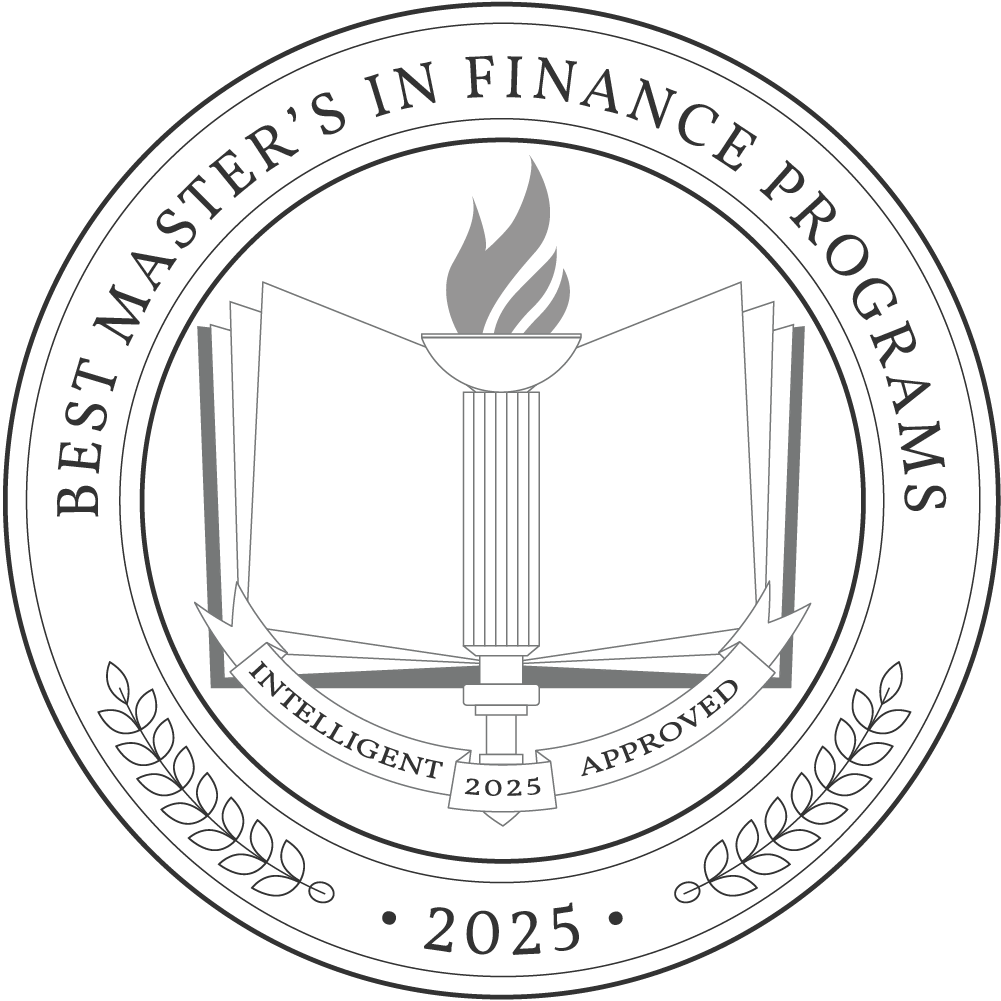Upgrading knowledge and skills through an advanced degree is a well-known strategy for improving marketability. Advanced finance degrees let you take advantage of higher-paying jobs in the financial sector. For instance, throughout 2033, the Bureau of Labor Statistics predicts a 17% growth in job openings for financial managers with an average annual salary of $156,100 and a 9% uptick in opportunities for financial analysts ($99,890 yearly pay). You can complete a master’s in finance degree program in as little as a year, with an average annual tuition cost of $20,513.
Why Trust Us
The Intelligent.com Higher Education Team is dedicated to providing students with independent, equitable school and program rankings and well-researched resources. Our expert-driven articles cover topics related to online colleges and programs, paying for school, and career outlooks. We use data from the U.S. Department of Education’s College Scorecard, the National Center for Education Statistics, and other reputable educational and professional organizations. Our academic advisory team reviews content and verifies accuracy throughout the year for the most current information. Partnerships do not influence rankings or editorial decisions.
- Analyzed over 2,000 national, accredited, and nonprofit colleges and universities
- 800+ rankings pages are reviewed and updated yearly
- Content is informed by reputable sources, surveys, and interviews with academic advisors and other experts
- Over 100 data points are reviewed for accuracy and quality throughout the year, including sources
How we rank schools
Our list features the best Finance degree programs at top colleges nationwide. Each school featured is a nonprofit, accredited institution — either public or private — with a high standard of academic quality for post-secondary institutions.
We evaluated each school’s program on tuition costs, admission, retention and graduation rates, faculty, reputation, and the student resources provided for online students. We collected data from trusted sources like the National Center for Education Statistics, individual school and program websites, school admissions counselors, and other data sources. Then, we calculated the Intelligent Score on a scale of 0 to 100 based on the following criterion:
Academic Quality:
- Admission rate versus enrollment rate
- Retention rate of students who return after year one
- Accreditation status (regional and programmatic)
- Nonprofit status, both private and public institutions
Graduation Rate
- Overall graduation rate
- Total number of currently enrolled students, including diversity metrics
- Student-to-faculty ratio
Cost and ROI
- In-state and out-of-state per-credit tuition rates and fees
- Required credits to graduate
- Earning potential after graduation
- Availability of federal student loans, scholarships, and other financial aid options
Student Resources
- Available student services for online-only and hybrid programs
- On-campus amenities like tutoring centers and the number of libraries
Read more about our ranking methodology.
Best 43 Accredited Master’s in Finance Degree Programs
FiltersInstitution Type
Status
- Intelligent Score
- Alphabetically By University Name
- Acceptance Rate
- Enrollment
- In-state Graduate Tuition
- Out-of-state Graduate Tuition
- In-state Undergraduate Tuition
- Out-of-state Undergraduate Tuition

Massachusetts Institute of Technology
Intelligent Score: 99.9In-state: $53,450
Out-of-state: $53,450
In-state: $53,450
Out-of-state: $53,450
SAT: 1510-1580
ACT: 34-36
The Sloan School of Management at MIT offers a graduate program for seriously high-performing students pursuing a Master of Finance degree. The program's coursework follows a STEM-classified curriculum across 18 months. However, MIT does provide an accelerated track that allows students to complete the program in as little as 12 months. Students can look forward to a hands-on experience from MIT's signature "Action Learning" approach through the school's Finance Lab and ProSeminars. These real-world environments allow students to tackle real financial challenges presented by working financial practitioners and engage in corporate-sponsored research and data analysis. Graduates of the Master in Finance program can look forward to an abundance of career success support through the university's advisors, employer relations team, Career Development Office, and Career Advising & Professional Development Office.
$1,327 - $1,824
On-Campus
New England Commission of Higher Education
66

University of Texas at Austin
Intelligent Score: 99.83In-state: $11,448
Out-of-state: $40,032
In-state: $12,028
Out-of-state: $12,028
SAT: 1210-1470
ACT: 26-33
$1,625 - $1,791
On-Campus
Association to Advance Collegiate Schools of Business
36

Texas A&M University Mays Business School
Intelligent Score: 99.54In-state: $8,395
Out-of-state: $36,849
In-state: $6,775
Out-of-state: $6,775
SAT: 1160-1380
ACT: 26-32
The Mays Business School at TAMU is responsible for administering the Master of Science in Finance degree program. Students are required to complete 36 hours of coursework, 10-15 hours of weekly summer homework, and two "mini-semester" Boot Camps. Core program courses cover finance and accounting, followed by six elective credits. This program was designed for undergraduates who have completed a degree outside of the finance discipline. One unique feature offered by TAMU is an Accelerated Admission process. TAMU sophomores can take 14 hours of M.S. in Finance courses priced at the undergraduate tuition, saving both time and money. Graduates of this program will be prepared to sit for professional designation exams such as the Chartered Financial Analyst (CFA) exam and the Chartered Market Technician (CMT) exam.
Resident: $868
Non-Resident: $1,410
On-Campus
Association to Advance Collegiate Schools of Business
36

Columbia University
Intelligent Score: 98.66In-state: $57,864
Out-of-state: $57,864
In-state: $49,024
Out-of-state: $49,024
SAT: 1460-1570
ACT: 33-35
$1,456
On-Campus
Association to Advance Collegiate Schools of Business
48

Indiana University-Bloomington
Intelligent Score: 97.57In-state: $9,815
Out-of-state: $36,194
In-state: $9,786
Out-of-state: $9,786
SAT: 1120-1350
ACT: 24-31
Resident: $739
Non-Resident: $1,406
On-Campus
Association to Advance Collegiate Schools of Business
33-38

University of Southern California
Intelligent Score: 97.55In-state: $59,260
Out-of-state: $59,260
In-state: $47,880
Out-of-state: $47,880
SAT: 1340-1530
ACT: 30-34
$2,307
On-Campus
Association to Advance Collegiate Schools of Business
36

University of Texas at Dallas
Intelligent Score: 97.01In-state: $11,448
Out-of-state: $40,032
In-state: $12,028
Out-of-state: $12,028
SAT: 1210-1470
ACT: 26-33
UT Dallas offers a Master of Science in Finance through the Naveen Jindal School of Management. This school runs a graduate program designed for students with or without a background in finance who have a Bachelor's degree from an accredited institution and meet grade point and test score requirements. Students can choose from two program options: The M.S. in Finance or the M.S. in Finance Cohort. The first option can be completed full-time or part-time, taking anywhere from 18 to 24 months. The second option is an accelerated full-time format that can be completed in as little as 12 months. Outside the core program coursework, students can choose from five concentrations: Financial Analyst, Corporate Finance/Investment Banking, Real Estate Finance, Financial Technology, or Financial Management.
Resident: $1,111
Non-Resident: $1,611
On-Campus
Southern Association of Colleges and Schools Commission on Colleges
36

University of Wisconsin - Madison
Intelligent Score: 96.17In-state: $9,273
Out-of-state: $37,161
In-state: $10,728
Out-of-state: $10,728
SAT: 1260-1460
ACT: 27-32
Resident: $900
Non-Resident: $1,688
On-Campus
Association to Advance Collegiate Schools of Business
30

Arizona State University
Intelligent Score: 95.68In-state: $10,710
Out-of-state: $28,800
In-state: $11,720
Out-of-state: $11,720
SAT: 1100-1320
ACT: 21-28
Resident: $884
Non-Resident: $1,429
On-Campus
Higher Learning Commission
32

University of Maryland
Intelligent Score: 95.07In-state: $8,824
Out-of-state: $34,936
In-state: $13,158
Out-of-state: $13,158
SAT: 1270-1480
ACT: 30-34
In State: $1,631
Out-of-State: $2,115
On-Campus
Association to Advance Collegiate Schools of Business
30

UF Warrington College of Business
Intelligent Score: 95.04In-state: $4,477
Out-of-state: $25,694
In-state: $10,770
Out-of-state: $10,770
SAT: 1290-1460
ACT: 29-33
In-State: $530 Out-of-state: $1,255
On-Campus
Association to Advance Collegiate Schools of Business
30

University of Chicago
Intelligent Score: 93.98In-state: $57,642
Out-of-state: $57,642
In-state: $60,300
Out-of-state: $60,300
SAT: 1500-1570
ACT: 34-35
$2,698
On-Campus
Association to Advance Collegiate Schools of Business
39

University of Alabama
Intelligent Score: 93.91In-state: $10,780
Out-of-state: $30,250
In-state: $10,780
Out-of-state: $10,780
SAT: 1070-1330
ACT: 23-31
Resident: $440 - $475
Non-Resident: $1,243 - $1,325
On-Campus
Southern Association of Colleges and Schools Commission on Colleges
30

Washington University in St. Louis
Intelligent Score: 93.63In-state: $56,300
Out-of-state: $56,300
In-state: $56,300
Out-of-state: $56,300
SAT: 1480-1560
ACT: 33-35
$2,560
On-Campus
Association to Advance Collegiate Schools of Business
30

Vanderbilt University
Intelligent Score: 93.43In-state: $52,781
Out-of-state: $52,781
In-state: $50,082
Out-of-state: $50,082
SAT: 1470-1570
ACT: 33-35
$2,245
On-Campus
Association to Advance Collegiate Schools of Business
33

University of Arizona
Intelligent Score: 92.5In-state: $10,990
Out-of-state: $33,273
In-state: $11,938
Out-of-state: $11,938
SAT: 1090-1350
ACT: 21-29
Resident: $908
Non-Resident: $1,794
On-Campus, Online
Higher Learning Commission
36

University of Illinois at Urbana - Champaign
Intelligent Score: 92.49In-state: $14,317
Out-of-state: $33,824
In-state: $15,016
Out-of-state: $15,016
SAT: 1200-1460
ACT: 27-33
$722
On-Campus
Association to Advance Collegiate Schools of Business
40

Louisiana State University
Intelligent Score: 91.71In-state: $8,038
Out-of-state: $8,038
In-state: $9,132
Out-of-state: $9,132
SAT: 1090-1300
ACT: 23-28
Resident: $316
Non-Resident: $881
On-Campus
Association to Advance Collegiate Schools of Business
36
How to Choose a Master’s in Finance Degree Program
Master’s degree programs in finance among individual schools may have the same goal, but each is unique. When narrowing down choices, consider your goals, personality, and budget to ensure the best fit for your life circumstances. Also, check that your chosen finance program is accredited by reputable business organizations.
Choose your area of study
A Master of Science in Finance (MSF) offers an intensive look at finance, including technical-specific skills, while a Master of Business Administration in Finance (MBA in Finance) prepares you for a broader role in managing a company’s finance department. Start by selecting a program that furthers your ambitions and interests. If you’re working in finance now, assess which degree would advance your career, either with your current employer or with others in the sector.
Research schools and programs
Every business school has a unique culture and learning environment, and this can differ across individual departments. Review websites and contact former students to get a feel for how you will fit in. Study the curriculum to see if it meets your career goals, gathering information on professors, class size, and classroom settings, including remote offerings and in-person requirements. Also, look into internships, projects, and completion time.
Prepare for tests and applications
In addition to program prerequisites, schools have eligibility requirements that often include references, recommended test scores, and minimum undergraduate performance (i.e., GPA). If your undergraduate study was unrelated to finance or you didn’t have a strong background in accounting, finance, or economics, you may need additional classes before enrolling. Finally, be prepared to pay application fees and pay attention to submission deadlines, as you’ll need time to gather transcripts and letters of recommendation. Apply early to receive the maximum amount of scholarship consideration.
Select your program
While you may have already decided between a Master of Science and a Master of Business Administration in Finance, you must choose from additional paths to match your degree to your career goals. For example, some business schools include an internship with their degree track. Internships provide hands-on experience, letting you practice in the real world. However, you may not need an internship if you plan to remain with your current employer.
Check out the amount and types of elective courses to ensure you have leeway to align your studies with your goals. Many programs will allow you to specialize in a particular niche, such as:
- Investment banking
- Financial economics
- Financial markets
- Financial management
- Portfolio management
- Risk management
- Quantitative finance
- International finance
- Corporate finance
Determine how you’ll pay for your degree
While education and its resulting knowledge represent great wealth, it costs actual dollars and cents. Make sure you’re aware of the total expenditure of your degree program, from materials, books, and tuition fees to indirect costs like allowing for study time (instead of working). Fortunately, most business schools provide opportunities for financial aid, such as scholarships, loans, and graduate work assistance programs. Finally, check with your current employer for tuition reimbursement programs and look into bank or federal loans specifically for education.
What Can You Expect From a Master’s in Finance Degree Program?
The length of your graduate program depends on several factors, including your undergraduate work, type of degree (MSF or MBA in Finance or a combination), and whether you choose to participate in an internship program. Some schools offer a master’s combined with an undergraduate degree, letting you earn both in four to five years, but you may need to include summers as well. However, depending on the required credits, most programs take 12 to 24 months to complete.
Master’s in finance degree programs typically include hands-on experience through labs, seminars, class projects, and internships. Be prepared for group discussions, whether in-person, via remote, or during conferences. Most schools provide access to speakers and seminars to help students keep up with real-world financial situations.
Potential courses you’ll take in a master’s in finance degree program
- Financial Accounting. This common core requirement teaches you how to analyze and use the information found in financial statements. You’ll also learn to present financial reports to upper management and strategize based on company data.
- Finance Ethics and Regulation. This class offers insights into common ethical challenges involved in finance. You’ll explore the reasons behind personal and corporate values and review the code of ethics for a financial professional.
- Financial Markets. With an increased focus on investment opportunities, from stocks to bonds and capital assets, a financial markets class looks at market trends and behavior. You’ll learn risk management tactics and better understand global markets.
- Analytics of Finance. Data analytics lets you turn masses of data into usable information. By applying the same techniques to finance, you’ll learn how to gather practical financial data and use it to predict and assess company performance.
- Corporate Finance. A corporate finance class goes beyond financial accounting into stock valuations, bankers’ risk management, and employee assessments. You’ll discuss how to raise capital and various cash flow scenarios.
Master’s in Finance Degree Frequently Asked Questions
How do I apply to a master's in finance degree program?
Most applications require an entrance fee, minimum test scores, transcripts, letters of recommendation, resume, and essays. You can find steps to the application process online at each school’s website. However, before starting, talk to an advisor, preferably in the graduate department, to ensure you’re eligible and that the program is within your budget. Consider attending an admission event to get a first-hand look at the school’s culture and check out the class profile online.
How much does a master's in finance degree cost?
According to the National Center for Education Statistics, tuition and fees for a master’s degree are, on average, $19,750 (from 2020-2021 data). However, there is a lot of variability within this figure. Public institutions are typically less expensive than private ($12,394 vs. $26,621), as is enrolling in an in-state school. Your method of attending class, in-person or remote, affects indirect cost factors like transportation, food, and lodging.
The length of the program (and required credit hours) plays a significant role in the final tally. Finally, don’t forget to consider hidden expenses, including health insurance, technology fees, and the cost of attending seminars or conferences.
How long does it take to earn a master's in finance degree?
Expect around a year to finish the average program. Completion time can vary depending on the program, type of degree, and how many courses you take at once. You may choose between an accelerated format or one with more practical training or customization, which takes longer.
Your class status, whether full- or part-time, also helps determine your completion time. Some schools require full-time participation, while others let you chip away at your degree as long as you meet minimum enrollment requirements. An MSF degree usually takes less time than an MBA in Finance.

